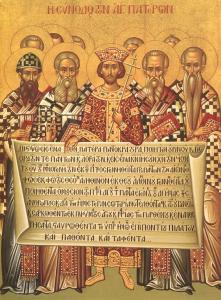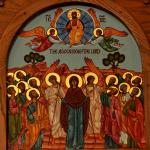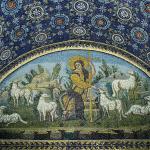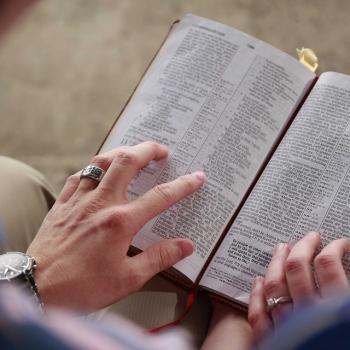
While we now take the Nicene Creed, and the other decrees of the Nicene Council, for granted, the council did not possess universal acceptance in its immediate aftermath. It took time before it became accepted and treated as it is treated today, representing the general norm of the Christian faith.
Nicea was called by St. Constantine, but he did so through his representative with the Christians, St. Ossius of Cordova. Before the council, Constantine had sent Ossius to Alexandria to deal with the growing conflict between St. Alexander with Arius. Ossius did not initially know what the controversy was about, but when he met with Alexander, and learned what Arius had been saying, he agreed with Alexander with Alexander’s condemnation of Arius. While there, Ossius had become friends with, and received as a mentor by, St. Athanasius, which is why Athanasius would defend his honor and integrity, even when others found reasons to question what Ossius did near the end of his life (that is, when he and his family were being tortured and were told the torturing would stop if he signed an Arian decree, Ossius did so, only to repudiate it as soon as he could; Athanasius said that he was not to be held culpable because he was compelled by force to sign the decree). Nonetheless, Constantine did not think Ossius’ initial investigation and conclusion was sufficient, as the controversy remained. This is why he had Ossius call for a church-wide council, one which Ossius would preside over, and one in which Constantine himself would be there to listen to and promote what he wanted out of the council, harmony among Christians.
Nicea was controversial, even for those who agreed with its teaching. This is because of the way it presented its primary teaching, that is, the way it presented the God the Father and God the Son were equally God (with the implication that the Holy Spirit is likewise equal to the Father and the Son, though that would take another council to make explicit). Ossius along with Alexander proposed the use of the term homoousios, of the same substance, to indicate the relationship and unity of the Father with the Son. While we now have no problem with the term, having become acquainted with it and its intended meaning, when it was used at Nicea, the last time the word has been suggested for Christological use, it had been condemned. The Synod of Antioch (c.267), when dealing with the errors of Paul of Samosata, saw his use of the word and how he applied it to reject the teaching of the Trinity, that is for the promotion of modalism, and used that to condemn the use of the word.
What had to be shown, so that those who were uncertain with the use of the term homoousios would accept it, is that even if it could be and was used heretically, it could also be used for and promote orthodoxy. Moreover, once it was properly employed, it needed to be demonstrated that once its use reinforced orthodoxy, it did so in a way its non-use did not, establishing why it should be used. To do this, it had to be shown that the concern at Antioch was with the meaning being suggested by the word, and not the word itself. This is why the spirit of dogmatic decrees is more important than the word choice employed, and why, if we find a particular word is sometimes used for heretical teachings, we must discern what those heresies are instead of assuming all use of the word has such a meaning. While those who were initially hesitant to accept the Nicene Creed and yet who eventually accepted it did so with this realization, sadly, throughout Christian history, Christians have to consistently re-awaken to this truth in regards other words, other dogmatic decrees. That is, they have to be taught that when reading dogmatic decrees, we must make sure we understand what is being condemned, and do not end up equivocating and condemning notions which were not condemned due to the way particular words can mean and be used in different ways. Thus, we must discern how that condemnation is intended, reading the way the heresies were presented, with the meanings behind them, so that if someone else uses a word that heresies use, such as homoousios, we do not assume they will be condemned by using that word themselves.[1]
While Nicea presented what would be the official response against Arianism, and would become universally accepted, it took centuries of conflict for this to truly come about. Arians and non-Arians alike found themselves in positions of political authority, or friends with those who had political authority, and used that authority to force their position upon each other. It is embarrassing to see the kinds of abuse Christians gave to each other, the way those who once fought against the use of torture or the death penalty to deny religious liberty ended up using both to promote themselves and deny the rights of their opponents. If we are to judge councils based upon their immediate aftermath, and how accepted they were, we would have to question the authority of Nicea, for not only do we find chaos, and widespread disagreement with it, we find Christians undermining the love and charity they should have as a result of that disagreement. But that is not how we are to judge councils. Nicea, given time, was shown to be authoritative, to be a norm which most Christians agreed to. Thus, we should not use confusion and antagonism coming after a council has been promulgated as proof that the council was invalid, otherwise, we would have to reject Nicea, the one council which is now most widely accepted by Christians
[1]The same is true in regards other theological terms and condemnations. A prime example of this is the condemnations of the notion of apokatastasis found in a particular systemization of Origen’s theological speculation, that is, in a particular form of Origenism. Even if we accept that the condemnation was properly promulgated by councils and not later added to their decrees, we must not assume the way some Origenists presented apokatastasis meant all forms of apokatastasis were similarly condemned. What was condemned was a kind of fatalism, one which involved not only the notion that all would be saved, that is, returned to the source from which they came, but then they would also be able to repeat the fall, and in doing some, find themselves in a constant, eternal cycle. Those who hope for, or believe, all will be saved for reasons not specifically condemned, hold positions which might be questionable to some, but nonetheless positions which are acceptable so long as they are found not to reject anything contained in divine teaching. This is why we find many who held to some notion of apokatastasis, some like St. Gregory of Nyssa, are not only not condemned, but are saints who are seen as major influences in the development and promotion of authentic Christian teaching. This would not be possible if we misinterpreted conciliar decrees by engaging their letter instead of their spirit. Once we understand this point, then, we find, this is true also with other condemnations. We must make sure we know not only the terms used, but the meaning behind the terms, to know what specifically is being condemned, so that then if we find people holding similar positions but for reasons which have yet to be condemned, we can acknowledge they might be orthodox, even if they hold views others find unusual or questionable
Stay in touch! Like A Little Bit of Nothing on Facebook.
If you liked what you read, please consider sharing it with your friends and family!
N.B.: While I read comments to moderate them, I rarely respond to them. If I don’t respond to your comment directly, don’t assume I am unthankful for it. I appreciate it. But I want readers to feel free to ask questions, and hopefully, dialogue with each other. I have shared what I wanted to say, though some responses will get a brief reply by me, or, if I find it interesting and something I can engage fully, as the foundation for another post. I have had many posts inspired or improved upon thanks to my readers.











